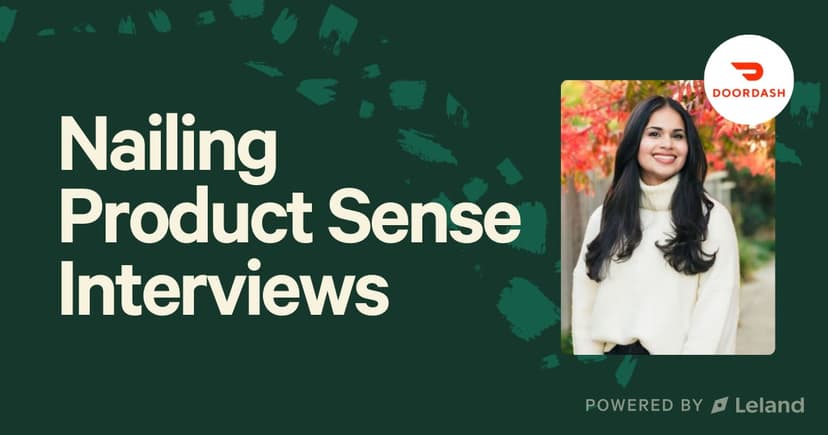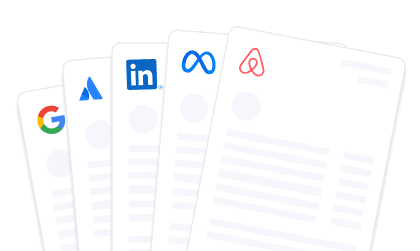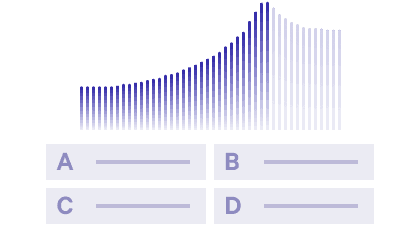Associate Product Manager Interview: What to Expect & How to Ace It
Learn what to expect in an associate product manager interview, from question types to preparation strategies that help you stand out.
Posted September 4, 2025

Join a free event
Learn from top coaches and industry experts in live, interactive sessions you can join for free.
Table of Contents
Preparing for an associate product manager interview means knowing both what the role demands and how hiring teams will evaluate you. Even though it’s an entry-level position, the process is designed to test your technical skills, analytical skills, and communication skills in the same way senior product managers are assessed. Strong preparation can make the difference.
In this article, you’ll learn what the associate product manager role involves, the stages of the interview process, the types of questions you’re likely to face, and strategies to help you perform at your best.
Understanding the Associate Product Manager Role
An associate product manager role is designed for candidates who are new to product management but ready to take on responsibility. Companies want candidates who can identify customer needs, work closely with cross-functional teams, and develop product ideas that connect to business goals. In this position, you are responsible for helping senior product managers with managing products, planning product strategy, and testing new features. You need to show an ability to communicate with stakeholders, manage projects across different teams, and think about how product features support company growth.
Skills that stand out in an interview include a clear understanding of software development, basic knowledge of computer science or a relevant field like business or marketing, and the ability to analyze data. Recruiters and managers also look for communication skills, because you need to communicate with engineers, designers, and directors effectively.
Read: Associate Product Manager: What it Is and How to Become One
Interview Stages and What to Expect
The first stage is usually a screening call. This often begins with a resume screen where a recruiter checks if your background matches the associate product manager position. Expect questions such as “Tell me about yourself” or “Why do you want this job?” You may also be asked about your past experience in a relevant field and how it connects to product management.
After that, you may have a product sense round. In this stage, you are asked to describe your favorite product and explain how you would improve it. The goal is to see if you can generate product ideas, identify customer needs, and connect them to business goals. For example, you may be asked how to improve Google Maps or another product you use daily.
Case studies and take-home assignments are also common. You might be asked to design a new feature or recommend a product strategy. These interviews often include trade-off discussions where you need to explain which features should be prioritized. A strong answer shows that you can identify the right features, manage business goals, and focus on customer needs.
Behavioral interviews test how you worked with teams in the past. A manager might ask you to describe a mistake you made when managing products or a time you worked with stakeholders to achieve results. These questions let you demonstrate leadership, teamwork, and your ability to learn from feedback.
You may also face technical and analytical questions. These can include estimation problems, such as “How many coffee shops are in New York City?” or data interpretation tasks where you explain what product metrics mean. Even though associate product managers are not responsible for coding, you need to show that you understand the process of software development and how data supports decisions.
The final step is usually an on-site or panel interview. You may meet with senior product managers, a director, and different teams you would work closely. This stage often mixes behavioral questions, product sense, and technical problem-solving.
Read: The Best Product Manager Interview Prep to Land the Offer
Common Associate Product Manager Interview Questions
Interview questions usually fall into a few categories.
| Category | Sample Question | Sample Answer |
|---|---|---|
| General Fit | Why do you want to be an associate product manager? | “I enjoy solving problems that make life easier for customers, and I like working with different teams to make that happen. The associate product manager role feels like the right step because it lets me learn directly from senior product managers while contributing to real projects. I see it as a way to grow my skills in product strategy and communication while making a clear impact.” |
| Behavioral | Describe a project where you worked with different teams to achieve a business goal. | “During a class project, I was assigned to lead a team that included people from marketing and computer science backgrounds. My job was to collect everyone’s input and shape it into a single plan. At first, we had very different ideas about priorities, but I organized short check-ins where we compared feedback and focused on what our end users needed. The final project came together smoothly, and we delivered something the whole team was proud of.” |
| Product Sense | What is your favorite product and how would you improve it? | “One product I use daily is Google Calendar. It’s simple and effective, but I often struggle when I have too many tasks that overlap. If I could add one feature, it would be a smarter scheduling tool that automatically suggests the best time for tasks by looking at my habits and existing events. That would reduce the stress of juggling work and personal commitments, which I know a lot of users experience.” |
| Strategy | How would you prioritize features for launch? | “I would start by looking at customer feedback and the company’s business goals. In my last internship, we had a long list of requested features, but we couldn’t build them all at once. I worked with my manager to use the RICE framework, which helped us choose the features that would reach more users and have the biggest impact. That experience taught me how to balance what customers ask for with what the business needs.” |
| Technical/Analytical | Estimate how many people use Google Docs daily. | “I’d start by breaking the problem into steps. Let’s assume there are about 1.5 billion people worldwide who use productivity tools. If half of them use Google Docs, that’s about 750 million. Now, not everyone uses it every day, so I would estimate that maybe 20–25% are daily active users, which gives a range of 150 to 200 million. I’d explain my assumptions clearly, and if I were on the job, I’d look for real data to confirm or adjust the estimate.” |
Preparation Framework
A clear study plan helps you prepare for the associate product manager interview. Start by reviewing your past experiences and building a set of STAR stories that describe your leadership, teamwork, mistakes, and achievements. Make sure each story connects to the skills companies value in an associate product manager role. Then practice product sense questions where you describe product ideas, identify customer needs, and explain how you would test new features.
You can also set up a study schedule that covers different types of interviews. One week can focus on behavioral interview questions, another on product strategy and case studies, and another on estimation problems and technical skills. Use tools like Trello, Google Analytics, or Figma to practice product design and product management tasks. Mock interviews with peers or coaches can also help you improve your communication skills and get feedback.
Read: The 10 Most Common Product Management (PM) Behavioral Interview Questions
Frameworks and Templates for Strong Answers
Several frameworks are useful in an associate product manager interview. The RICE method helps you evaluate product features by looking at reach, impact, confidence, and effort. MoSCoW is another framework that organizes features into must-have, should-have, could-have, and won’t have. Interviewers expect you to know these strategies and use them when discussing product strategy.
When answering behavioral questions, use the STAR method: describe the situation, explain the task, share the action you took, and finish with the result. For metrics questions, focus on engagement, retention, and revenue. For example, you might say you would track daily active users, customer return rate, or conversion to paid features.
Example of Using Frameworks in an Interview
Imagine the interviewer asks, “How would you decide which feature to launch first for our note-taking app?”
Sample Answer:
“In my last internship, I worked on a similar problem where we had to pick between improving search, adding offline mode, or redesigning the homepage. I used the RICE framework to guide the decision. Search had the highest reach because 40 percent of users complained about it. The impact was also high since a better search would make the app easier to use every day. Our confidence was strong because feedback came from multiple surveys, and the effort was only about two weeks of development. That gave it the highest score, so we prioritized search first.”
If they ask how you would manage the scope.
Sample Answer:
“I would apply the MoSCoW method. For launch, secure text search was a must-have, offline mode was a should-have, homepage design updates were a could-have, and we left out integrations as a won’t-have. This made it clear what the team should focus on.”
For a behavioral angle, you might get the question,
“Tell me about a time you worked with cross-functional teams to improve a product.”
Sample Answer:
“During my internship, the company wanted to reduce drop-offs in onboarding. My task was to collect input from design, marketing, and engineering. I organized weekly syncs and created a shared document with all feedback. I then suggested a shorter onboarding flow and presented it to the director. The result was a 15 percent improvement in retention within the first month.”
If they shift to metrics, you could say:
“To measure success, I would look at engagement through daily active users, retention by tracking how many people use the feature after 30 days, and revenue impact through conversion rates to premium plans.”
Note: Using tools like RICE, MoSCoW, and STAR shows you’re not just answering questions. You’re showing you can think clearly and take on real responsibility.
Read: The 50 Most Common Product Manager Interview Questions (With Sample Answers)
Questions to Ask Your Interviewer
You should also prepare questions for the interviewer. Strong questions show that you are serious about the PM role and want to grow in product management. You can ask how the company measures success for associate product managers, what growth looks like after completing an APM program, or how product managers work closely with marketing, engineering, and leadership. These questions demonstrate curiosity and the ability to think about business goals.
Read: 20+ Best Questions to Ask at the End of an Interview
5 Expert Tips for Your Associate Product Manager Interview
Preparing for an associate product manager role isn’t just about knowing frameworks. It is about showing how you think, communicate, and work with different teams. These tips will help you stand out during pm interviews and demonstrate real product management skills.
1. Keep A Story Bank
Have a few examples ready from past projects where you worked with cross-functional teams, solved a mistake, or managed more responsibility. It makes answering interview questions way easier.
2. Put Numbers to Trade-offs
When you talk about product strategy, don’t just say “I’d prioritize this feature.” Show how many customers it might reach, how much effort it takes, and why it matters for business goals.
3. Link Ideas Back to Growth
If you suggest new features, tie them to retention, revenue, or customer needs. That’s what senior product managers and directors want to hear.
4. Explain Tech Simply
You don’t need to code, but you should be able to explain software development or data decisions in plain language. It shows strong communication skills.
5. Ask Smart Questions
At the end, don’t just ask about the job. Ask how the company measures success for product features or how managers decide which customer feedback to use. That shows real product sense.
Read: The 20 Most Important Product Manager Skills
The Bottom Line
An associate product manager interview tests your ability to generate product ideas, analyze data, and communicate with different teams. You will be asked about your past experiences, your strategies for managing products, and your ability to identify customer needs. If you prepare for behavioral, product sense, technical, and strategy questions, you will demonstrate the skills that senior product managers, directors, and companies expect from this entry-level role.
Start your PM Interviews with our Expert Coaches
If you want guided practice for your associate product manager interview, you can connect with a Leland coach. With structured support, you can show the ability and talent needed to achieve growth in product management. Talk with our expert coaches now!
Read these next:
- How to Get Into the IBM Associate Product Manager (APM) Program
- An Overview of the Different Roles in Product Management
- Product Management Case Study Interviews: The Ultimate Guide
- The Product Design Interview: Ultimate Guide (With Common Questions)
- Product Sense: What it Is & How to Develop It
- An Overview of the Different Roles in Product Management
- 20+ Free Product Management Resources
FAQs
What is an associate product manager?
- An associate product manager (APM) is an entry-level role in product management. They help senior product managers with tasks like researching customer needs, organizing product features, and working with cross-functional teams.
Is an associate product manager an entry-level job?
- Yes. The associate product manager position is usually the first step into product management. It’s designed for candidates from relevant fields like business, marketing, or computer science who want to grow into a full product manager role.
What is the average salary of an associate product manager?
- In the U.S., associate product managers earn around $70,000 to $100,000 per year, depending on the company, location, and experience. Big tech companies often pay at the higher end of the range.
How hard is it to get Google APM?
- The Google APM program is very competitive. Thousands of candidates apply each year, and only a small percentage are accepted. To succeed, you need strong analytical skills, communication skills, and the ability to show product sense in interviews.






























